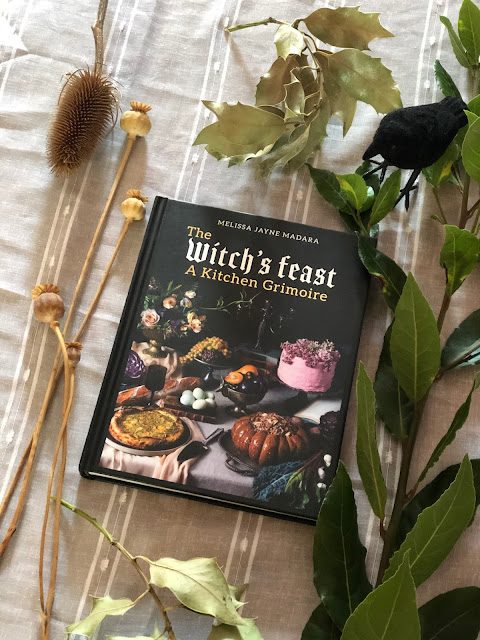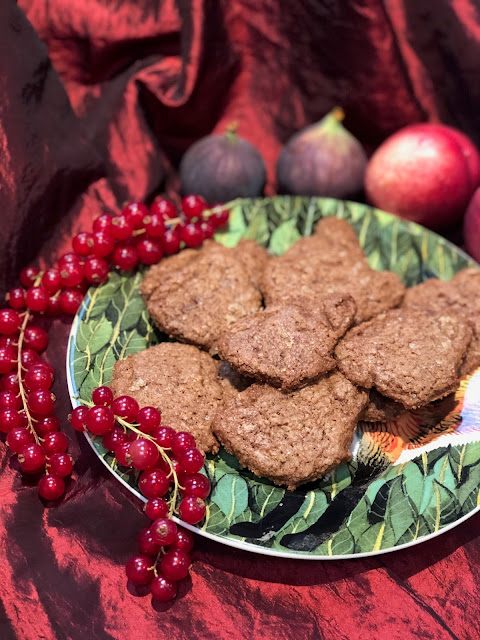"As you navigate the following pages, consider the lives of witches and mystics long gone who continue to communicate with us through these recipes, and let their work inform your practice as you venture out from the edge of tradition and into the magical unknown".
I hope this intriguing quote has caught your attention.
The Witch's Feast: A Kitchen Grimoire by Melissa Jayne Madara (26th October, Watkins; £25; 9781848994034) is truly a source of fascination and a must read for the coming Hallowe'en. This essential companion to kitchen witchraft is a beguiling compilation of history and art of magical cooking, with a wide selection of recipes.
Melissa Jayne Madara is a witch, herbalist and chef, who will be your Virgil, guiding you through the realms of witchcraft, magic and cooking. They invite you to tour five dimensions or facets of the occult via culinary insights.
The book is divided into five parts: Feast of the Ancestors, Feast of the Stars, Feast of the Heavens, Feast of the Earth and Feast of Spells.
In the Introduction Melissa explains how they had always had an interest in chemistry and science, and how cooking offers "an opportunity for tactile engagement with the mysteries of chemical flux and the transformative power of fire". They talk about the metamorphic possibility of transforming ingredients into delicious dishes. Cooking, according to Melissa, is a liminal ground between science, magic and art, which becomes their artistic medium of choice.
Words "art" and "artistic" are important in this context, as Melissa's recipes are truly a work of art, creative and thought-provoking.
It's curious how Melissa says that the two disciplines of magic and cooking share some things in common, for example, both practices possess an air of secrecy, never revealing their secrets too readily (I'm sure we have all encountered reticent cooks whose recipes we admired and asked to share only to be fobbed-off with a vague reply. Yes, some cooks do not want to share their secrets).
Melissa's discussing the mystical link between magic and food. The author "extends an invitation to play with fire, both figuratively and literally, and through this playful investigation explore what power and potency kitchen witchcraft may offer us today".
As this is a magical cook book, not all ingredients are readily available in shops or online. Herbs and wild foods needed for some recipes might inspire you to go foraging. There are useful tips on foraging, if you haven't done this before, for example, never harvest more than a quarter of what you see, be respectful and mindful of nature.
The first captivating chapter is named Feast of the Ancestors which features traditional feasts, recipes and rituals of witches past. The historical research which went into the writing of this book is impressive. You will discover the ancient recipes of the Babylonians which were inscribed on the clay tablets from around 1700BCE, among other historical food data and cooking instructions. Melissa has adapted the recipes to make them more appealing to the modern public.
I have bookmarked several recipes to try in the future, for example, Pharmakos Cakes, the sacrifical cakes of the Ancient Greeks, or the Fornacalia Focaccia, immortalised by the Roman poet Ovid.
I read with interest the extract on Maslenitsa, the Slavic folk and religious festival.
The Pancakes cooked for the Maslenitsa are part of my heritage, so I was intrigued to see what Melissa would offer for the feast - their recipe for Straw-infused crepes for the butter lady sounds fun (though fresh cherries are a bit of a poetic licence, as they wouldn't be available traditionally at that time of the year). Also ricotta cheese is a recent addition to the Russian tables. Cottage cheese would be more authentic (you can find decent cottage cheese in the Polish delis or Polish aisles of the supermarket. The British cottage cheese widely available in the shops is too soggy for the recipe).
So far I have tried only one recipe from the book - Hildegard von Bingen's Cookies of Joy. She was a German Benedictine abbess, mystic and visionary, and also an accomplished author and polymath. Her recipe for Cookies of Joy uses plenty of spices, including cinnamon, nutmeg, cloves. According to Hildegard, the spicy wholewheat cookies will keep you strong, happy and alert. How can one resist such a recommendation?
The chapted titled Feast of the Stars explores cooking through the wheel of the zodiac. Here Melissa talks about the fascinating art of astrology and offers a perspective on the work of the astrological cooking, which provides a useful new lens for our continued investigation into the tools of kitchen witchcraft.
I chuckled to myself, reading about the Pisces that they are known for being easily swayed by indulgence (mea culpa!). I love Melissa's recipe for Roasted cauliflower with miso and yogurt, as suggested for Pisces. That's definitely on my must-try list.
Feast of the Heavens is all about the planetary magic in the kitchen. "A working knowledge of these spheres and their properties forms the basis for planetary magic, which draws its power and inspiration from the fabric of the cosmos itself". How does it apply to the kitchen? It means a careful selection of ingredients associated with the planets, and using them to create dishes at auspicious times and in conjunction with appropriate symbols, so that your meal is a worthy dedication to the celestial power.
For example, Melissa's menu for the Full Moon Feast includes a mushroom and parsnip soup, gnocchi with sage blossom pesto and black sesame cake. For the New Moon Feast the menu is equally delectable - a kale salad with hazelnuts and black garlic, five-spice fried mushrooms and a chocolate poppyseed cake.
Feast of the Earth talks about the seasonal meals for the solstices and equinoxes. "In examining the religions of the ancient world, we often find the rhythms of nature personified, even deified, to reveal various aspects of spiritual mystery... This is the rhythm of the Sun, king of the cosmos and the central star in our galactic neighbourhood". The author finds great beauty and magical potency in following these crucial cycles, as well as a deep wisdom.
For the forthcoming Winter Solstice Melissa invites you to create a feast of fire cider pickled eggs, lentils and roasted roots with walnut sauce, cheesy celeriac mash and cranberry gingerbread. There is a beautiful story of Melissa celebrating the Winter Solstice by going to the forest at dusk and sharing the story of the past year with their special inhuman family.
The final chapter, Feast of Spells introduces you to potions, rites and dinner spells. The recipes here represent the simplified, stripped-down versions of what Melissa makes at home, because the kind of work they do is highly personal. The author invites their readers to bring in their own traditions and relationships to spirit, and thus personalise their own withcraft practice.
Here the concept of the Feast table as a sacred space and magic circle is re-introduced. Melissa discusses in-depth the practice of sigilcraft, consecration, divination and even sacrifice, including the vegetarian options. The recipes vary from a rosemary star bread for home-blessing to ritual bread masks, from chocolate, beetroot and grapefruit celebration cake to pressed-violet offering cookies.
The Witch's Feast is an unusual, original cook book, with a plethora of mouth-watering recipes to please the most discerning gourmet. If there's a foodie or a cook book collector among your family or friends, this book will make a fabulous gift for Halloween, birthday or Christmas. You don't have to be a follower of witchcraft to appreciate the culinary aspects of the book and historical research which accompanies each chapter.
About the Author
Find Melissa's Instagram at @saint.jayne








No comments:
Post a Comment